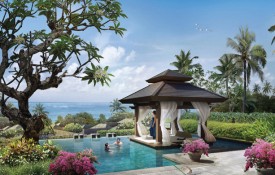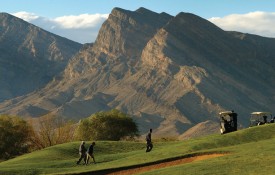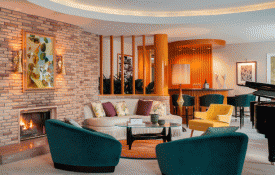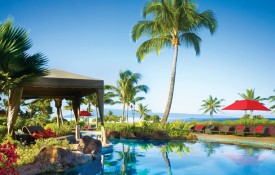“Wellness” can be an ambiguous catchall for anything from mindful meditation to intense physical fitness. But one brand clearly defines the wellness revolution: Six Senses.
“Wellness is one of our base pillars,” says Stockholm-based Anna Bjurstam, wellness pioneer for Six Senses Spas and Wellness. “We do everything around it. In the past, it was maybe just in one spa facility within a hotel, but what we’ve done is take an integrated approach to wellness throughout our properties—from how we treat our staff in the back of the house to how we build our hotels.”
Indeed, a world-class spa is one thing—and Six Senses has long been known for them—but true wellness requires a holistic approach to everything from architecture and building materials and how a bedroom is furnished, to food selection, stress management, and fitness.
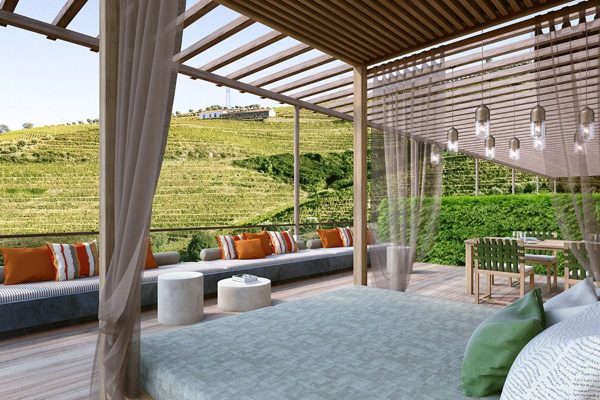
One of the newly added guest accommodations at the Six Senses Douro Valley, designed by wellness expert Clodagh.
From its inception, Six Senses has focused on being in harmony with the environments its resorts are built in and been proponents of sustainable tourism.
“My first spa was the Raison d’Etre spas in the Maldives in 1998, rebranded to the first Six Senses Spa in 2000. At that time, there was no wellness component to the spas, but we were thinking far beyond just massages. For instance, we wanted all of the products we used to be completely natural, so we worked with a chemist to create a special line … it was unheard of in those days, but it’s that kind of attention to detail that we built the brand around,” says Bjurstam.
When the brand was sold to Pegasus Capital in 2012, the new owners wanted Bjurstam to come on board full time. “We had done spas for Capella, Aman, Taj and many more. They saw that wellness was growing and being incorporated in different ways,” she says. The team ended up bringing in experts on sleep, biometric screenings, interior design, and much more, working with New York–based Clodagh for its resorts in Kaplankaya, Turkey, and Portugal’s Douro Valley.
“In the end, a vacation is about having fun and enjoying life, not about deprivation. Wellness doesn’t have to be a hard quest. We know that small, incremental steps will have a lasting effect on long-term behavior more than a weeklong fast or boot camp,” says Bjurstam, pointing out examples such as how organic bedding can change the way you sleep, or pizza with less gluten can help with digestion.
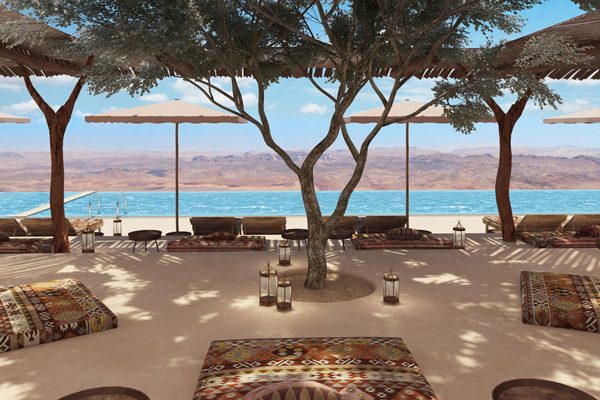
The forthcoming property in Israel’s Arava Valley.
In February 2019, the brand was acquired by Intercontinental Hotel Group (IHG) for more than $300M. IHG, which also recently acquired Regent Hotels & Resorts and Kimpton Hotels & Restaurants, plans to expand the brand over the next 10 years to operate more than 60 hotels, all while maintaining Six Senses’ core values.
“One thing we’ve been looking at for the future is new fields like energy medicine, working with shamans and specialists in India and Africa,” Bjurstam says. “It’s like a meeting of quantum physics and energy medicine, and we’re looking at how we can alleviate traumas in energy fields.”
In terms of new destinations, one of the more exciting openings for the brand isn’t in a far-flung locale, but in the heart of New York City. Six Senses, set for an early 2021 opening, will combine a Six Senses hotel with its first private-club concept called Six Senses Place, complete with a gym, workspace bar, vibrational plates to help with frequency alignment, and virtual reality experiences. “You’ll be able to go on a ‘mini-trip’ for three minutes and totally step out of your environment. You can also get cryotherapy, hang upside down, or have a pick-me-up tonic and then head to the rooftop for a DJ set or maybe a shamanic journey to cleanse your energy field,” Bjurstam says.
However, those looking for their next exotic wellness adventure will want to look to Israel’s Arava Valley, where the Shaharut property will offer an Earth Lab, camel stables, and an open-air amphitheater. Also consider the forthcoming property in India, built on a former fort and located just 30 minutes from Ranthambore National Park, where guests can go on daily safari drives to see leopards, nilgai antelope, wild boars, sambar deer, sloth bears, and tigers. sixsenses.com






































